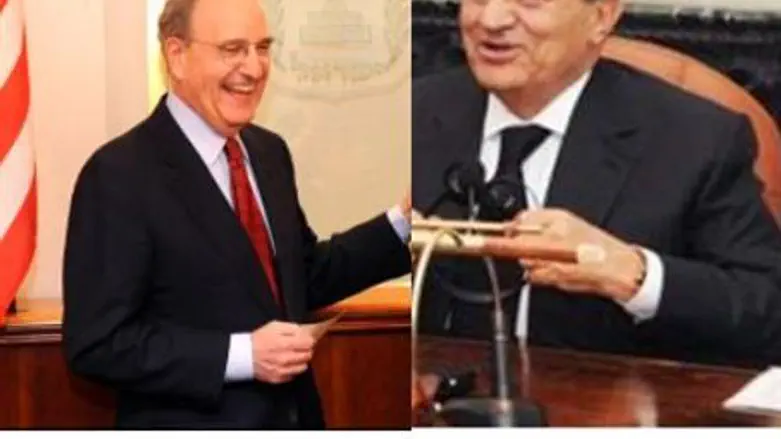
Tunisia has risen (or fallen); and now, Egypt, the historically stabilizing force in the Arab world is on fire, in chaos. Stealthily, almost invisibly, the Muslim Brotherhood is gathering its power in Suez, Alexandria, and Cairo. Wealthy Egyptians have already chartered private planes and flown to safety. President Mubarak has reportedly sent his wife and heir out to London many days ago.
Some wealthy Egyptians refuse to leave. They are personally guarding their gated Cairo homes from looters. I heard such a man’s voice on television last night. It was hoarse with anguish and anger, trembling with fatigue. “This land belongs to the Egyptian people not to Mubarak. This home belongs to me, I own it, I will not flee. I will guard it with my life.” ![]()
As I write, the Egyptian police are still fighting the protesters. Armed groups have freed prisoners and jailed Muslim militants. Looting is widespread.
Will Al-Qaeda, the Muslim Brotherhood, Iran’s Hezbollah in Lebanon and Syria, Gaza’s Hamas, soon proclaim an Arab Caliphate and further launch World War Four, this time with their hands on the levers of power in five or six states? Will Mubarak actually manage to hold onto power?
At this precise and critical moment, our Presidential Speechifier has still not risen to the task. He is walking a “careful line,” and waiting to see what develops. Well, what else can he really do? Send in the troops? Nah—he campaigned on his opposition to the troops we already have in Iraq and Afghanistan—and, bogged down though we might be, even Obama was forced to understand that America’s other options might be even worse.
Shamefully, Obama did not even stand rhetorically with the demonstrating and bloodied democrats on the streets of Tehran and he is now only tepidly standing with their counterparts on the streets of Cairo. Yes, America has always supported the Arab “Strong Horse,” the brutal dictator whose reign has been justified as a means of ensuring regional stability. Karzai is our man on the ground, as is Mubarak. Secretary of State Clinton has called for “an orderly transition.” She opposes “violence.” The Pentagon has called for “restraint.”
I have no idea what they mean. Do you?
Tyrannical as Mubarak has been, if he goes, the Muslim Brotherhood and possibly Al-Qaeda will zoom to power. And, believe it or not, they will be worse, ever so much worse, both to their own people and to the West.
The barefoot Egyptian protesters, the suffering and impoverished people, are simply not organized ideologically, politically, economically, or militarily. They will have no way of holding their own against such dark and purposeful forces. They have not read Saul Alinsky’s guidebook and have no charismatic and well-connected leader. One wonders whether the Egyptians finally rose up because they saw Tunisians doing so—and successfully—on the internet, on Al-Jazeera.
Is this an era of cellphone revolutions? Will all that bright technology only end up ushering in a new Dark Age?
I dare not mention Israel, or the West, whose fates are intimately entwined with this Cairo uprising. I dare not spell out the possible implications for Israel, the only democracy in the region, of an Islamist take over, not only in Iran and Gaza, but in Lebanon, Syria, and Egypt. If Islamists win the day, what will happen to Israel’s “cold” peace with Egypt, and to Egypt’s American-financed military? Will Iran neatly step in?![]()
Will Saudi Arabia—the funder of Islamism, the fount of religious and gender apartheid—actually turn to Israel and America as allies--to do the heavy lifting for them against Iran?
At this precise and critical moment, the New York Times Magazine has published a very long cover story which both exonerates and congratulates itself on how it handled the Wikileaks revelations. Executive Editor Bill Keller smoothly comes off as his own hero—sage, prudent, responsible, objective, as he depicts Julian Assange as the weirdo, geeky villain—manipulative, bullying, irresponsible, dangerous, certainly no journalist.
The Times portrays itself as the soul of responsible journalism: objective, unbiased, (is he kidding?) virtuous—Hell, Keller’s crafted persona strikes one as God-like. He wants us to know that, unlike Assange, the Paper of Record carefully redacted names and identities so that the blood of pro-American Afghans or Iraqis will certainly not be on the Gray Lady’s hands; Keller also tells us that they checked with the White House (!) before publishing and that yes, they took some suggestions to heart.
They are the Good Guys.
The scary thing is that if I hadn’t personally, intellectually, seen incredibly high-handed, wildly biased, and highly distorted coverage in their pages, I would believe every word Keller writes. Most of his loyal readers will do just that. Maybe he’ll ever get a Pulitzer Prize for how nobly he handled the Assange material.
One wonders why he feels the need to distance himself from Assange at this point. What else does he know that he’s not telling us?
No need to worry: Assange will Tell All in his own book.
http://www.newsrealblog.com/2011/01/30/pharoah-is-dead-long-live-pharoah/